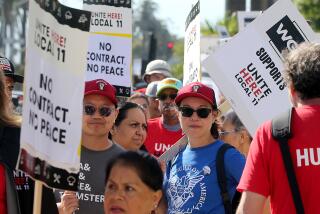Soviets Seek Western Partners for Project : Moscow Hotel/Theater Complex Backers Bring Unusual Offer to L.A.
- Share via
In a concrete example of how trade relations are changing under Soviet leader Mikhail S. Gorbachev’s perestroika policy, a high-level Soviet delegation representing the national Union of Theater Workers visited Los Angeles this week seeking a U.S. partner to build and manage a $150-million, 500-room hotel and theater complex in Moscow.
This is the first time the Kremlin has allowed a union, rather than a state institution, to directly solicit Western financing for its projects, delegation members said. “A few years ago, no one would ever have dreamed such a thing would be possible,” said Alexander Rubenstein, the union’s finance director.
The union, which also is talking to European interests, is offering better terms than the Kremlin normally does because it has received a special license directly from Gorbachev. It lets the union give 50-50 participation by a foreign investor, rather than the usual 51-49. It also would allow Western partners to take their share of the profits out of the Soviet Union in hard currency--a traditional sticking point in many East-West trade deals.
By Soviet calculations, six years “at the most” will be needed for the expected 17% return on investment. While $75 million would be invested by both partners, the Soviets intend to put up only $25 million and ask the Western investors to extend credit for the other $50 million to be paid back “as soon as the first dollar is generated,” said Kiril Labrov, who is chairman of the 51,000-member union and who sits on the Soviet Central Committee.
The presence in the Soviet delegation of Mikhail Shatrov, a prominent Soviet playwright, underscores the unusual nature of the theatrical union’s venture into the international hotel business.
“I didn’t know what the word ‘investment’ meant before now,” Shatrov admitted.
But Labrov insisted that “we’re (the union) not doing something that has absolutely nothing to do with theater. We believe that we are capable of producing major projects with substantial profits. So we demanded the right to set up joint ventures.”
The union won its negotiation privileges, U.S. sources close to the deal said, because Gorbachev is a “theater buff,” has a close friendship with Mikhail Ulyanov--who heads a unit of the national theater union and is one of his nation’s leading actors--and hopes to win continued support for his reforms from Soviet intellectuals.
The union, which represents playwrights, directors and actors, has been granted about $160 million in hard currency to conduct, independently, “foreign economic activities related to the theater area,” Labrov said. “We have all the necessary support of the government and all the necessary guarantees of the financial agencies to now proceed.”
The proposed complex’s site, allocated to the union by the Moscow Council, is 22 1/2 acres abutting the Moscow River and boasts a view of the Kremlin.
The union is selling its project to Western investors by pointing to a reported 5,000-room shortage in Moscow, which should mean that the new hotel will be fully occupied for the near future. The union already can guarantee full occupancy for six years based on assurances it has from “Western travel agencies,” Rubenstein said.
Although the union is seeking either institutional or private investors, the Western partner must include an “experienced hotel operator,” he emphasized.
The delegation came to Los Angeles at the suggestion of Bill Bushnell, artistic producing director of the Los Angeles Theater Center. Bushnell, who has had a long relationship with the Soviet theater, said LATC will be a “financial beneficiary of any deals which might arise from my introductions. As I understand it, this would be a finder’s fee of 5% of undiluted net of the entire deal.”
Wednesday night, LATC hosted the Soviets at a dinner underwritten by potential investors at the Regency Club in Westwood.
Those present included: John Kirk, vice president of Park Lane Hotels; Len Rushfield, executive vice president and director of American Express Bank International; Frank Hickman, senior vice president of Tishman Realty Co.; Gary Winnick, president of Pacific Asset; Howard Koff, president of Integrated Financial; Kent Damon, president of Arco Investment Management Co., and lawyers representing hotel and other interests.
More to Read
Sign up for Essential California
The most important California stories and recommendations in your inbox every morning.
You may occasionally receive promotional content from the Los Angeles Times.













